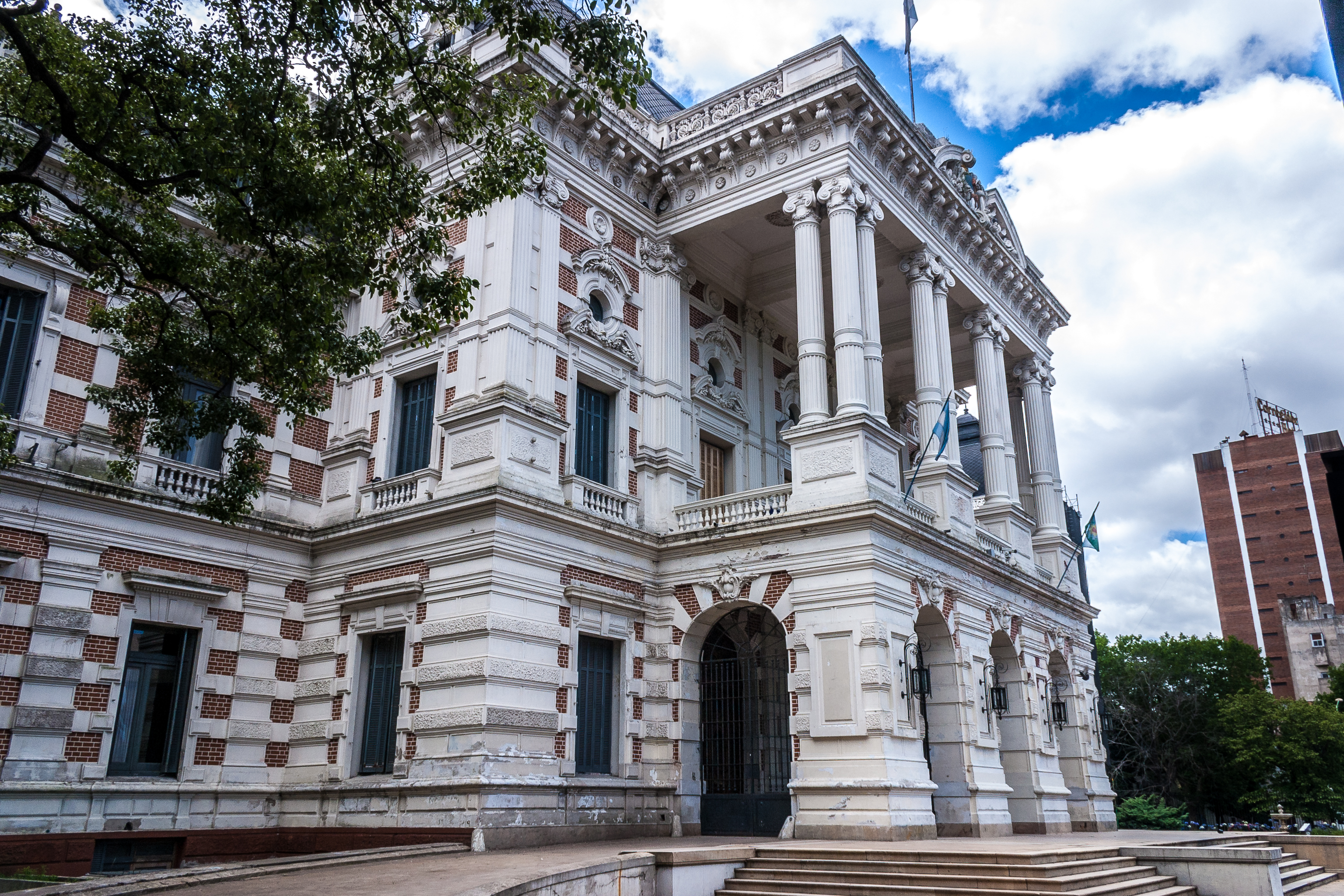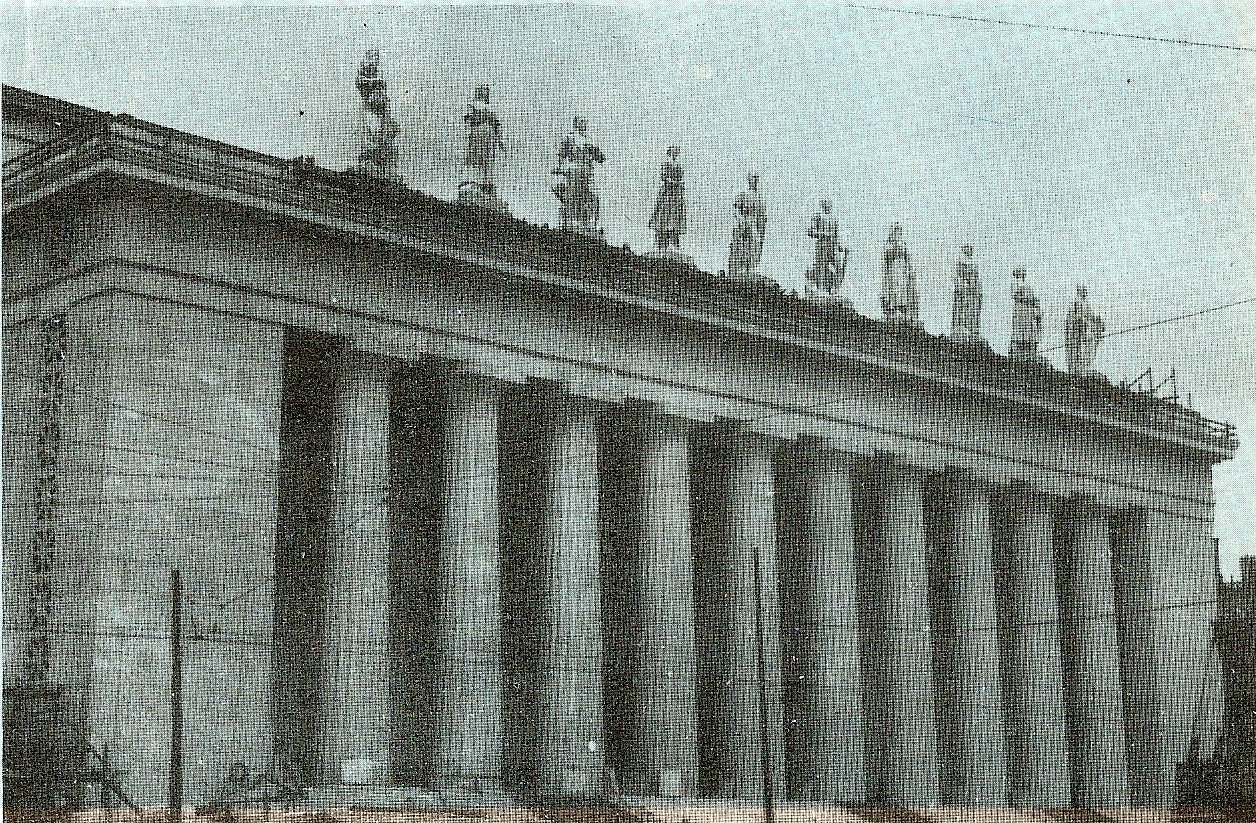|
Elva Roulet
Elva Pilar Barreiro de Roulet (born 1932), more commonly known as Elva Roulet, is an Argentine architect and politician who was Vice Governor of Buenos Aires Province from 1983 to 1987. She also served as Secretary of Housing and Environmental Structuring of Argentina from 1987 to 1989, during the presidency of Raúl Alfonsín, and as a member of the 1994 Constituent Assembly. Elected in the Radical Civic Union (UCR) ticket alongside Governor Alejandro Armendáriz, Roulet was the first woman to serve as vice governor and the first woman elected in a gubernatorial ticket of any Argentine province. No other woman would hold that office until 1999, when Mercedes Oviedo was elected Vice Governor of Misiones. Roulet was born in 1932 in Juan Nepomuceno Fernández, a small town in the Necochea Partido of Buenos Aires Province. She studied architecture at the University of Buenos Aires Faculty of Architecture and Design, graduating in 1957. She then went on to earn a degree on Devel ... [...More Info...] [...Related Items...] OR: [Wikipedia] [Google] [Baidu] |
Governor Of Buenos Aires Province
The Governor of Buenos Aires Province () is a citizen of the Buenos Aires Province of Argentina, holding the office of governor for the corresponding period. The governor is elected alongside a vice-governor. Currently the governor of Buenos Aires Province is Axel Kicillof since December 11, 2019. Requirements To be able to be elected governor, the person must be an Argentine citizen and must have been born in Argentina, or be the child of an Argentine citizen if born in a foreign country.Constitución de la Provincia de Buenos Aires - Art- 121 The citizen must also be at least 30 years old, and have at least 5 uninterrupted years of residence in the province if not natural from it. The term lasts 4 years, with the chance of a single reelection. List of o ...
|
Faculty Of Architecture, Design And Urbanism, University Of Buenos Aires
The Faculty of Architecture, Design and Urbanism (''Facultad de Arquitectura, Diseño y Urbanismo''; FADU) is a faculty of the University of Buenos Aires (UBA), the largest university in Argentina. Established in 1901 as the School of Architecture, it has since expanded to impart courses on graphic design and urbanism. Most of the faculty's facilities are located at Pabellón III of the Ciudad Universitaria complex, the UBA's only centralized campus, in the Buenos Aires neighborhood of Núñez. As of 2011, it was the third-largest faculty at UBA, with 25,748 regular students. History The University of Buenos Aires officially began imparting architecture degrees in 1901, becoming the first architecture school in Argentina. The department of architecture was in the beginning part of the Faculty of Exact, Physical, and Natural Sciences, which had its seat at the Manzana de las Luces complex, in Downtown Buenos Aires. Adjacent to the faculty were the Colegio Nacional de Buenos ... [...More Info...] [...Related Items...] OR: [Wikipedia] [Google] [Baidu] |
Vice Governors Of Buenos Aires Province
A vice is a practice, behaviour, habit or item generally considered morally wrong in the associated society. In more minor usage, vice can refer to a fault, a negative character trait, a defect, an infirmity, or a bad or unhealthy habit. Vices are usually associated with a fault in a person's character or temperament rather than their morality. Synonyms for vice include fault, sin, depravity, iniquity, wickedness, and corruption. The antonym of vice is virtue. Etymology The modern English term that best captures its original meaning is the word ''vicious'', which means "full of vice". In this sense, the word ''vice'' comes from the Latin word '' vitium'', meaning "failing or defect". Law enforcement Depending on the country or jurisdiction, vice crimes may or may not be treated as a separate category in the criminal codes. Even in jurisdictions where vice is not explicitly delineated in the legal code, the term ''vice'' is often used in law enforcement and judicial systems a ... [...More Info...] [...Related Items...] OR: [Wikipedia] [Google] [Baidu] |
University Of Paris Alumni
A university () is an institution of tertiary education and research which awards academic degrees in several academic disciplines. ''University'' is derived from the Latin phrase , which roughly means "community of teachers and scholars". Universities typically offer both undergraduate and postgraduate programs. The first universities in Europe were established by Catholic monks. The University of Bologna (), Italy, which was founded in 1088, is the first university in the sense of: *being a high degree-awarding institute. *using the word (which was coined at its foundation). *having independence from the ecclesiastic schools and issuing secular as well as non-secular degrees (with teaching conducted by both clergy and non-clergy): grammar, rhetoric, logic, theology, canon law and notarial law.Hunt Janin: "The university in medieval life, 1179–1499", McFarland, 2008, , p. 55f.de Ridder-Symoens, Hilde''A History of the University in Europe: Volume 1, Universities i ... [...More Info...] [...Related Items...] OR: [Wikipedia] [Google] [Baidu] |
University Of Buenos Aires Alumni
A university () is an institution of tertiary education and research which awards academic degrees in several academic disciplines. ''University'' is derived from the Latin phrase , which roughly means "community of teachers and scholars". Universities typically offer both undergraduate and postgraduate programs. The first universities in Europe were established by Catholic monks. The University of Bologna (), Italy, which was founded in 1088, is the first university in the sense of: *being a high degree-awarding institute. *using the word (which was coined at its foundation). *having independence from the ecclesiastic schools and issuing secular as well as non-secular degrees (with teaching conducted by both clergy and non-clergy): grammar, rhetoric, logic, theology, canon law and notarial law.Hunt Janin: "The university in medieval life, 1179–1499", McFarland, 2008, , p. 55f.de Ridder-Symoens, Hilde''A History of the University in Europe: Volume 1, Universities in the Middl ... [...More Info...] [...Related Items...] OR: [Wikipedia] [Google] [Baidu] |
Radical Civic Union Politicians
Radical (from Latin: ', root) may refer to: Politics and ideology Politics *Classical radicalism, the Radical Movement that began in late 18th century Britain and spread to continental Europe and Latin America in the 19th century *Radical politics, the political intent of fundamental societal change *Radical Party (other), several political parties *Radicals (UK), a British and Irish grouping in the early to mid-19th century *Radicalization *Politicians from the Radical Civic Union Ideologies *Radical chic, a term coined by Tom Wolfe to describe the pretentious adoption of radical causes *Radical feminism, a perspective within feminism that focuses on patriarchy *Radical Islam, or Islamic extremism *Radical Christianity *Radical veganism, a radical interpretation of veganism, usually combined with anarchism *Radical Reformation, an Anabaptist movement concurrent with the Protestant Reformation Science and mathematics Science *Radical (chemistry), an atom, molecule, or ion ... [...More Info...] [...Related Items...] OR: [Wikipedia] [Google] [Baidu] |
Architects From Buenos Aires
An architect is a person who plans, designs, and oversees the construction of buildings. To practice architecture means to provide services in connection with the design of buildings and the space within the site surrounding the buildings that have human occupancy or use as their principal purpose. Etymologically, the term architect derives from the Latin , which derives from the Greek (''-'', chief + , builder), i.e., chief builder. The professional requirements for architects vary from location to location. An architect's decisions affect public safety, and thus the architect must undergo specialised training consisting of advanced education and a ''practicum'' (or internship) for practical experience to earn a license to practice architecture. Practical, technical, and academic requirements for becoming an architect vary by jurisdiction though the formal study of architecture in academic institutions has played a pivotal role in the development of the profession. Origins Th ... [...More Info...] [...Related Items...] OR: [Wikipedia] [Google] [Baidu] |
Living People
Purpose: Because living persons may suffer personal harm from inappropriate information, we should watch their articles carefully. By adding an article to this category, it marks them with a notice about sources whenever someone tries to edit them, to remind them of WP:BLP (biographies of living persons) policy that these articles must maintain a neutral point of view, maintain factual accuracy, and be properly sourced. Recent changes to these articles are listed on Special:RecentChangesLinked/Living people. Organization: This category should not be sub-categorized. Entries are generally sorted by family name In many societies, a surname, family name, or last name is the mostly hereditary portion of one's personal name that indicates one's family. It is typically combined with a given name to form the full name of a person, although several give .... Maintenance: Individuals of advanced age (over 90), for whom there has been no new documentation in the last ten ... [...More Info...] [...Related Items...] OR: [Wikipedia] [Google] [Baidu] |
1932 Births
Events January * January 4 – The British authorities in India arrest and intern Mahatma Gandhi and Vallabhbhai Patel. * January 9 – Sakuradamon Incident (1932), Sakuradamon Incident: Korean nationalist Lee Bong-chang fails in his effort to assassinate Emperor Hirohito of Japan. The Kuomintang's official newspaper runs an editorial expressing regret that the attempt failed, which is used by the Japanese as a pretext to attack Shanghai later in the month. * January 22 – The 1932 Salvadoran peasant uprising begins; it is suppressed by the government of Maximiliano Hernández Martínez. * January 24 – Marshal Pietro Badoglio declares the end of Libyan resistance. * January 26 – British submarine aircraft carrier sinks with the loss of all 60 onboard on exercise in Lyme Bay in the English Channel. * January 28 – January 28 incident: Conflict between Japan and China in Shanghai. * January 31 – Japanese warships arrive in Nanking. February * February 2 ** A general ... [...More Info...] [...Related Items...] OR: [Wikipedia] [Google] [Baidu] |
Faculty Of Engineering, University Of Buenos Aires
The Faculty of Engineering (''Facultad de Ingeniería''; FIUBA) is a Faculty (division), faculty of the University of Buenos Aires (UBA), the largest university in Argentina. It offers graduate courses on various fields of engineering, including civil engineering, computer science and engineering, mechanical engineering, electronic engineering, naval engineering, among others. It also offers graduate courses on system analysis, as well as post-graduate degrees on the magister degree, magister, doctorate, doctoral and post-doctoral levels. It was founded in 1952, as a split from the Faculty of Exact and Natural Sciences. As of 2011, it counted with 8,698 graduate students, making it the eighth-largest constituent faculty at the university. The faculty has its main seat on Av. Paseo Colón 850, in a Neoclassical architecture, Neoclassical building in the Buenos Aires neighborhood of San Telmo, Buenos Aires, San Telmo. It also has an annex building on Av. Las Heras, in Recoleta, Bueno ... [...More Info...] [...Related Items...] OR: [Wikipedia] [Google] [Baidu] |






